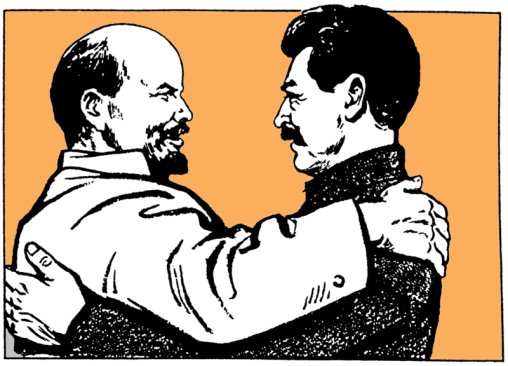 Against State Socialism
Against State Socialism
The outcome of state socialism, in its various forms, is negative overall. Historically, state socialism has been used as a weapon against the form of socialism developed by the workers themselves : crisis management by social democracy, construction of a « patriotic » capitalism by left-wing nationalism and of a bureaucratic state capitalism by Leninism, then Stalinism and Maoism.
Although these regimes have been able, for a period, to orchestrate social reforms, they did so without ever setting free from the capitalist paradigm of production, nor from its inherent hierarchies between those who lead and those who are led.
Each time repressing or domesticating the independent social movements, they even, in some periods, assumed explicit responsibility in playing a counter-revolutionary role (Germany 1918- 1919, Russia 1918-1921, Spain 1937-1939, Hungary 1956, Algeria 1965, Czechoslovakia 1968,
Poland 1980...).
In doing so, they stifled the political capacities of the proletariat and subsequently facilitated the return of the traditional bourgeoisie to power.
Social democracy

Social democracy is based on the illusion of a « neutral » State above all classes, which could therefore potentially be convertible in favour of the interests of the exploited.
But in this illusion lies a double lure : first, the promise of running the State against capitalist interests ; second, the promise of a progressive, reformist, peaceful and legal transformation of society — through laws and decrees — from capitalism to socialism.
The result is a « respectful » political strategy embedded in the institutions of capitalism. Should it self advocate as « socialist », « labour » or « environmentalist », social democracy always remains above all a statist socialism, based on delegation of power, benefiting politicians and the bureaucratic ruling classes.
In the course of the 20th century, the accession to power of social democracy may have coincided with some social advances. But these achievements are the fruit of grassroot struggles. Social democracy as an agent of the dominant classes is there to put an end to these struggles, satisfying some of their demands before they spread too far and start questioning the foundations of the capitalist system. When outside struggle periods, the social democracy in power does not obtain any concessions, and quite on the contrary even participates in destroying what had been conquered.
The balance of social democracy is disastrous for the proletariat : the establishment of « social peace » in which workers lose their capacity to resist ; the submission of the trade union organizations and the social movement to the electoral calendar or to governmental politics when the left is in power.
In the end, caught in the trap of the management of capitalism, social democracy has always ended up adopting its codes and ideology.
Left-Wing Nationalism

Governments sometimes claim to oppose capitalism in the name of the nation. Thus, regimes such as Nasserism in Egypt, Peronism in Argentina and Chavism in Venezuela have claimed to be a form of socialism by nationalizing key sectors of the economy and improving the situation of the poor classes.
However, the real ambition of left-wing nationalists is to shape a national capitalism, bringing together a strong State led by a charismatic leader shaking hands with a patriotic employer class, and putting social movements under tutelage.
Historically, far from working in the interests of their homeland, left-wing nationalist regimes have produced a bureaucratic class and an owning class that have always ended up serving their own interests, to the detriment of the working class, reduced to celebrating the beneficent leader.
Leninism and Stalinism
As a project of revolutionary transformation of society under the leadership of a ruling party and through the stateization of the entire economy, Leninism also failed by disregarding and fighting most of the self-governing and federalist socialism that had emerged within the proletariat. The balance is terrible, and bloody dictatorships have tainted the very word « communism ».
History has now shown that the stateization of the means of production does not imply a break with the capitalist relations between the rulers and the ruled, but the passage from a fragmented, competing capitalism to a state capitalism, with a new exploiting class at its head.
No party can proclaim itself « the vanguard of the proletariat » and impose its dictatorship on the workers in the name of their emancipation. The centralized and hierarchical form of the Leninist party, in line with its function of taking power and monopolizing the state apparatus, leads to tyranny inside the organization, to the crushing of protest outside, to the separation of the party from the workers and from society.
The strategy of taking the power through the party also leads to odious practices within the framework of the daily struggles : submitting the mass organizations and the trade unions to the directives of the party — the scheme of the transmission belt — sprawling state intervention or else prevailing the superior interest of the party over the necessities of the struggle.
Of course, we do not consider Leninism and Stalinism to be the two sides of a same coin. The former is an authoritarian revolutionary current, while the latter is a totalitarian bureaucratic system. However, they both come from Bolshevism, an authoritarian current of socialism. And it must be said that Leninism has sawn the seeds of this bureaucracy, and opened the way for crimes against democracy and against the proletariat. These regimes are responsible for the restoration of capitalism and their ruling classes have generally remained in power by converting themselves back to the capitalist system and ideology.








